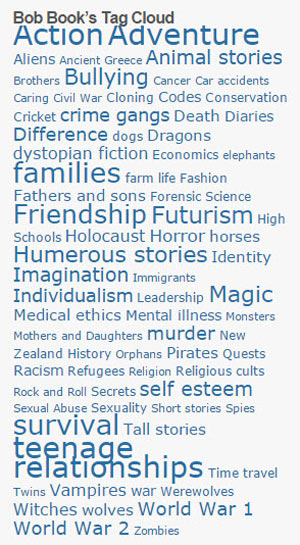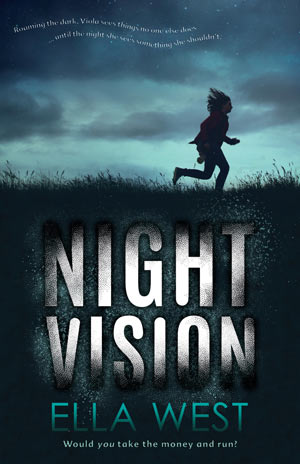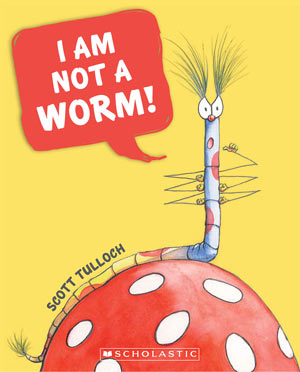Issue 94
Term 3 2015
Promoting literature to students
Based in New Zealand as a literacy consultant, Bob Docherty offers his knowledge and passion for children’s literature to promote reading and literacy in schools.
I have always believed that one of the best qualities of human beings is their ability to take an emotion, an experience, a fantasy, or a fact and write it in a way that only real experience can surpass. Taking good literature to students in schools is not only essential but also the best way to get children interested in books and reading. They need to know what they can read and that reading is worthwhile. This is especially true for boys, but not exclusively as girls are dropping off reading too.
For the past six years I have set myself up as a promoter of literature and reading to children and young adults in New Zealand schools. My background at the National Library of New Zealand, selecting fiction and picture books for the 'Schools Collection', built my knowledge of literature, and I grew to realise that children and young adults needed to be told about all those wonderful stories.

Bob's Books Tag Cloud, created from the tags attached to book reviews
School libraries do a brilliant job but they are under increasing pressure to reduce staff and costs as electronic sources take precedence. Librarians and teachers don't have as much time these days to get to know literature in the way necessary to effectively promote it to their students. But I do, and this is how I do it. Hopefully my methods will help you to do it too.
It all starts with having an electronic eye on the world: my blog, 'Bobs Books'. Here I review all kinds of books from picture books and early readers to young adult novels. Some books are sent to me by publishers and by self-publishing writers, and others I select myself from children and young adult book reviews. Most items come from either Australia or New Zealand, where writers are really world class and relevant to the 'down under' culture.
My blog entries are a brief summary of plot or of what I think will be a great attraction to young readers; and are designed to make them want to read the books. I never give the ending away but say enough to evoke interest.
When I go into a school I take my own selection of books geared to the class levels that I am going to be talking to. I then peruse the shelves of the library to see if there are some gems that perhaps no-one knows about-there always are-and these form the basis of my talks.
My technique is basically story telling. As I read a book to the students, I am thinking about the best way to promote it. Sometimes I will take a particular scene in the book and act it out. This is a good technique to start with. It has to be genuine and you have to do it well. It gives you street cred, and means that the students will take the rest of your talk seriously. Lately I have been using Night Vision by Ella West (Allen and Unwin, 2014), in which a teenager with a skin condition lives her life at night and witnesses a murder in a forest while wearing night vision glasses. When I read from this book, nobody moves.
Once you have hooked them in, vary the genre of the books so that a wide range is covered. I always have a non-fiction title with me on sport, war, hunting and fishing, dancing, or making yourself look like a zombie, for those children who like 'real stuff'.
As I speak I am checking out the students' interest in the books to see what works and what doesn't. I also have a go-to, high impact story ready for any restlessness, particularly from boys. Lately I have been using The Lost by Alex Shearer (Pearson Education, 2006), about a boy who goes missing after following a fire engine.
Another way of promoting a story is to focus on the characters: Who are they? What do they like? Do they have any secrets? How do they dress? Who are their friends? What is their relationship with their parents like? I'll cover anything about them that is unique, and anything that is common to all of us. Empathy is a big thing.

Night Vision by Ella West
Theme is another way in. For seniors I have been using John Green's novels, particularly Looking for Alaska (Penguin, 2006), and All the Bright Places by Jennifer Niven (Penguin, 2015). This last title is about mental illness and suicide, so it is wise to consult teaching staff to see if there are any dangers or resistance to talking about such topics, before introducing books like this.
With juniors I use humour and illustrations. Little kids love to laugh and it doesn't hurt to make yourself do silly things. I have been using I am Not a Worm! by Scott Tulloch (Scholastic NZ, 2014) lately, which has a great 'You Did, I Didn't' sequence in it. If the story is good but the written text too complicated, I will tell the story in my own words and let the pictures do the rest.

I am not a worm! by Scott Tulloch
I do talk about relationships in books. With seniors I will discuss sexuality although not explicitly; more about wishes and desires. You can hear a pin drop when this happens. With younger readers I talk about attraction and changing body shapes.
Reading a short passage from a novel is often enough, then I'll say 'if you want to know more you will have to read it yourself'.
Most of my sessions last about 45 minutes to an hour, and I leave time for questions although I don't force it. I like to know what children are reading, and they often seek assurance that the books they are reading are known by me. I never criticise a book; I always encourage. The challenge is not just to get children to read but to keep them reading, to move them to a better class of literature and to know that it is good for them.
I always end a session by saying that if there is one thing they can do for themselves that will give them an advantage in life, then reading is that one thing. It teaches them how language works, it gives them ideas, and it increases communication skills. Schools I have spoken at report a huge increase in reading after I leave.
These techniques work, and I am invited back year after year. In a world where most of the jobs that our children will do have not yet been invented, reading is a passport to greater learning and personal development. It is even better than rum and raisin chocolate.
Image credits
- I am not a worm! by Scott Tulloch. © 2014 Scholastic NZ
- Night Vision by Ella West. © 2014 Allen and Unwin
- Bob's Books Tag Cloud. Available at: https://bobsbooksnz.wordpress.com/
